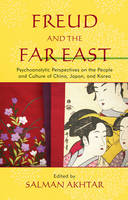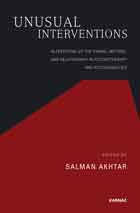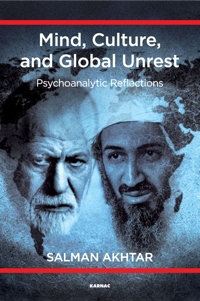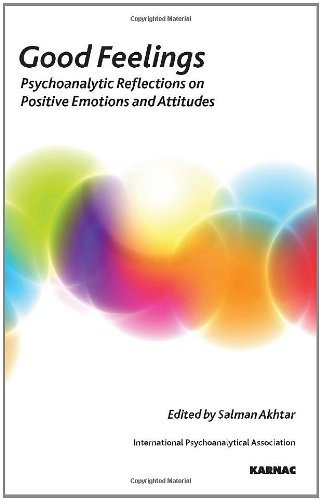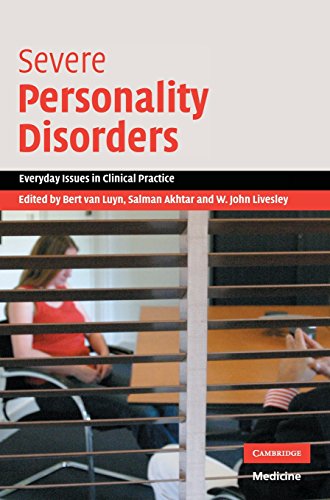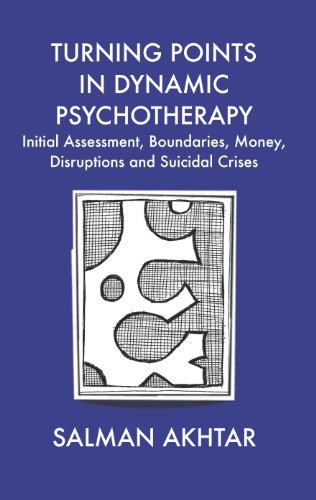Salman Akhtar

Salman Akhtar, MD, is professor of psychiatry at Jefferson Medical College and a training and supervising analyst at the Psychoanalytic Center of Philadelphia. He has served on the editorial boards of the International Journal of Psychoanalysis and the Journal of the American Psychoanalytic Association. His more than 450 publications include twenty-three solo authored books – Broken Structures (1992), Quest for Answers (1995), Inner Torment (1999), Immigration and Identity (1999), New Clinical Realms (2003), Objects of Our Desire (2005), Regarding Others (2007), Turning Points in Dynamic Psychotherapy (2009), The Damaged Core (2009), Comprehensive Dictionary of Psychoanalysis (2009), Immigration and Acculturation (2011), Matters of Life and Death (2011), Psychoanalytic Listening (2013), Good Stuff (2013), Sources of Suffering (2014), No Holds Barred (2016), A Web of Sorrow (2017), Mind, Culture, and Global Unrest (2018), Silent Virtues (2019), Tales of Transformation (2022), In Leaps and Bounds (2022), and In Short (2024) – as well as sixty-nine edited or coedited volumes in psychiatry and psychoanalysis. Dr. Akhtar has delivered many prestigious addresses and lectures including, most significantly, the inaugural address at the first IPA-Asia Congress in Beijing, China (2010). Dr. Akhtar is the recipient of the Journal of the American Psychoanalytic Association’s Best Paper of the Year Award (1995), the Margaret Mahler Literature Prize (1996), the American Society of Psychoanalytic Physicians’ Sigmund Freud Award (2000), the American College of Psychoanalysts’ Laughlin Award (2003), the American Psychoanalytic Association’s Edith Sabshin Award (2000), Columbia University’s Robert Liebert Award for Distinguished Contributions to Applied Psychoanalysis (2004), the American Psychiatric Association’s Kun Po Soo Award (2004), the Irma Bland Award for being the Outstanding Teacher of Psychiatric Residents in the country (2005), and the Nancy Roeske Award (2012). He received the Sigourney Award (2013), which is the most prestigious honor in the field of psychoanalysis. Dr. Akhtar is an internationally sought speaker and teacher, and his books have been translated in many languages, including German, Turkish, and Romanian. His interests are wide and he has served as the film review editor for the International Journal of Psychoanalysis, and is currently serving as the book review editor for the International Journal of Applied Psychoanalytic Studies. He has published eighteen collections of poetry and serves as a scholar-in-residence at the Inter-Act Theatre Company in Philadelphia. His Selected Papers (Vols I–X) were recently published and released at a festive event held at the Freud House & Museum in London.
Lying, Cheating, and Carrying on: Developmental, Clinical, and Sociocultural Aspects of Dishonesty and Deceit
What constitutes a lie? What are the different types of lies? Why do people lie? Is dishonesty ubiquitous in human experience? And what should be done with individuals who seek psychotherapeutic help... (more)
The Damaged Core: Origins, Dynamics, Manifestations, and Treatment
This comprehensive and tightly argued book deals with the process through which a coherent self evolves, the various ways such development fails to occur, and the therapeutic measures to put things... (more)
Freud and the Far East: Psychoanalytic Perspectives on the People and Culture of China, Japan, and Korea
This book is a lexical ambassador with the dual responsibility of bridging the West and East and enhancing psychoanalytic conceptualization in the course of such an encounter. By juxtaposing the... (more)
The Wound of Mortality: Fear, Denial, and Acceptance of Death
Death is a much avoided topic. Literature on mourning exists, but it focuses chiefly upon the death of others. The inevitable psychic impact of one's own mortality is not optimally covered either in... (more)
Matters of Life and Death: Psychoanalytic Reflections
The author's focus in this book is upon the intrapsychic vicissitudes of what it means to be truly alive and how death accompanies us at each step of our life's journey. He attempts to show that,... (more)
Unusual Interventions: Alterations of the Frame, Method, and Relationship in Psychotherapy and Psychoanalysis
Radical departures from the set and familiar rules of technique often become necessary in the course of psychotherapy and psychoanalysis. These can include conducting a session outside the office,... (more)
Mind, Culture, and Global Unrest: Psychoanalytic Reflections
In this compact and pithy book, the distinguished and prolific psychoanalyst Salman Akhtar steps out of his consulting room to address certain matters of urgent global concern. These include... (more)
Fear: A Dark Shadow Across Our Life Span
Beginning with Freud’s celebrated case of Little Hans, psychoanalysts and psychotherapists have been intrigued with the topic of fear. Eclipsed in theoretical writings by the term ‘anxiety’, fear... (more)
Sources of Suffering: Fear, Greed, Guilt, Deception, Betrayal, and Revenge
This concise and well-written book deals with six important roots of human anguish. It divides the six areas into those primarily affecting the individual and those primarily affecting others around... (more)
Guilt: Origins, Manifestations, and Management
In this elegantly written book, eight distinguished psychoanalysts address the ubiquitous phenomenon of guilt. They describe the childhood experiences that form the bedrock of this emotion and... (more)
Good Feelings: Psychoanalytic Reflections on Positive Emotions and Attitudes
This tightly edited volume opens a new vista in psychoanalysis by focusing upon positive and life-enhancing emotions and attitudes. The realms it covers include love, friendship, enthusiasm, courage,... (more)
The African American Experience: Psychoanalytic Perspectives
Brings together the contributions of distinguished mental health professionals and scholars of humanities to offer a multifaceted perspective on the transgenerational trauma of slavery, the hardship... (more)
Interpersonal Boundaries: Variations and Violations
Across the lifespan we may experience moments of sublime intimacy, suffocating closeness, comfortable solitude, and intolerable distance or closeness. In Interpersonal Boundaries: Variations and... (more)
The Geography of Meanings: Psychoanalytic Perspectives on Place, Space, Land, and Dislocation
This book is a multi-faceted attempt to understand the psychological mysteries of land, space, native cultures, changing eras, and geographical dislocation. It shows us that many remote and seemingly... (more)
Three Faces of Mourning: Melancholia, Manic Defense and Moving on
Mourning and the importance of the capacity to bear some helplessness, while still finding pleasure in life, are central to this tightly organized volume. The multi-faceted processes involved in... (more)
Severe Personality Disorders
This book is about understanding and managing patients with severe personality disorders. It covers biological, psychoanalytic and cognitive-behavioural approaches and provides a pragmatic guide to... (more)
Listening to Others: Developmental and Clinical Aspects of Empathy and Attunement
This edited volume addresses the critical psychoanalytic issue of effective listening. This issue has been discussed widely in the literature but most often from the standpoint of technique.... (more)
Turning Points in Dynamic Psychotherapy: Initial Assessment, Boundaries, Money, Disruptions and Suicidal Crises
'Putting aside the narcissistic-masochistic aspiration of authoring a text on all the intricacies of in-depth psychotherapy, I have chosen to address five areas of difficulty in this enterprise. This... (more)
The Crescent and the Couch: Cross-Currents Between Islam and Psychoanalysis
Attempting to advance knowledge about Islam and to create the possibility of a dialogue between Islam and psychoanalysis, The Crescent and the Couch brings together a distinguished panel of Muslim... (more)
Beyond the Symbiotic Orbit: Advances in Separation-Individuation
In this tribute to Selma Kramer, eminent child analyst and colleague and close friend of the late Margaret Mahler, senior analysts explore the continuing relevance of Mahler's... (more)
A Quest for Answers: A Primer of Understanding and Treating Severe Personality Disorders
This text examines severe personality disorders from various angles. It covers: diagnosis and differential diagnosis; structure and dynamics; origins and development; evaluation and triage;... (more)
The Internal Mother: Conceptual and Technical Aspects of Object Constancy
This work analyses the concept of object constancy in the light of developmental research and clinical practice. The clinical implications of disturbances in object constancy are discussed, with... (more)
The Seasons of Life: Separation-Individuation Perspectives
This work shows how, in applying Margaret Mahler's developmental framework to the life-cycle, the separation-individuation process continues, even after a degree of self and object constancy has been... (more)
Intimacy and Infidelity
Contents include: Fidelity: from cannibalism to imperialism and beyond; intimacy and individuation; egocentricity. (more)
Broken Structures: Severe Personality Disorders and Their Treatment
This book integrates psychiatry and psychoanalysis to present deeper and sounder clinical profiles of the personality disorders than have been hitherto available. (more)
Brothers and Sisters: Developmental, Dynamic, and Technical Aspects of the Sibling Relationship
Sibling relationships and rivalry are as old as recorded history. This analysis explores that ambivalence between siblings, which casts its shadow throughout people's lifetimes and affects their... (more)
Immigration and Identity: Turmoil, Treatment and Transformation
Why do people migrate from one country to another? What is the difference between an immigrant and an exile? What determines the psychological outcome of immigration? Can one ever mourn the loss of... (more)
The Colors of Childhood: Separation-Individuation Across Cultural, Racial and Ethnic Diversity
Starting from a separation-individuation perspective, this text discusses cultural issues in child rearing and clinical practice. Included are chapters on African-American, Japanese, and South... (more)
Does God Help?: Developmental and Clinical Aspects of Religious Belief
Can psychoanalysis lead us toward understanding the roots and nature of religious belief? In this text, five classical psychoanalysts representing five different religious faiths share their... (more)
New Clinical Realms: Pushing the Envelope of Theory and Technique
Focusing on facets of mental functioning and psychopathology that remain largely unrecognized in psychiatric and psychoanalytic literature, this work raises intriguing questions about man's... (more)




